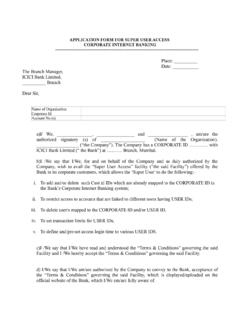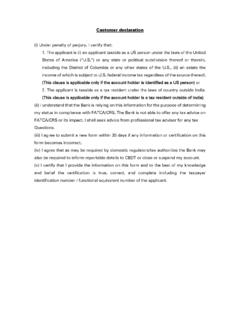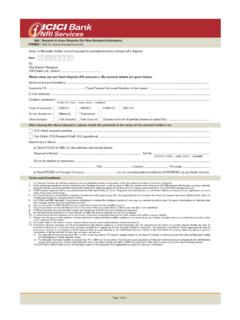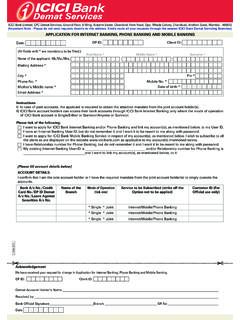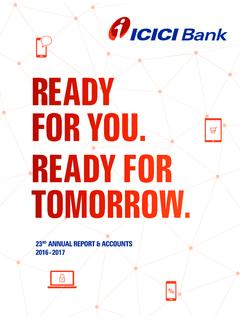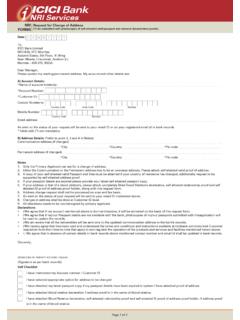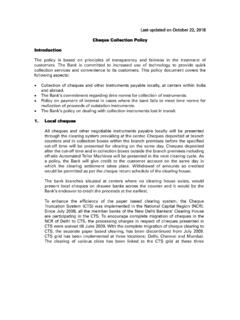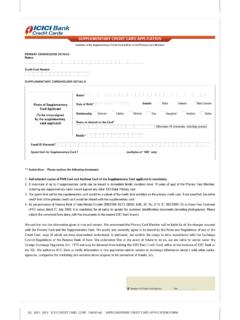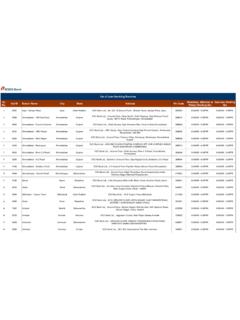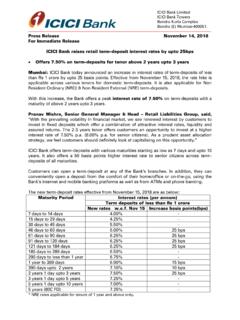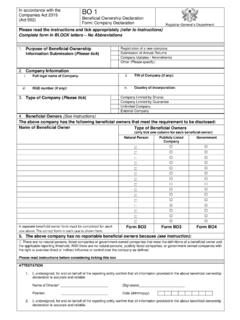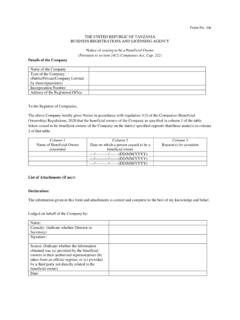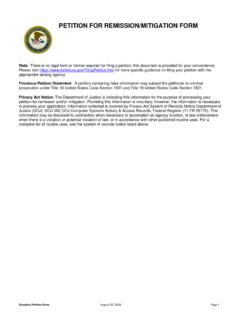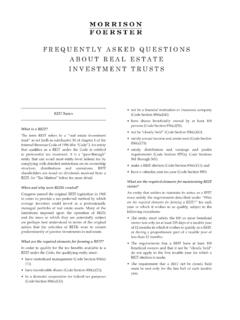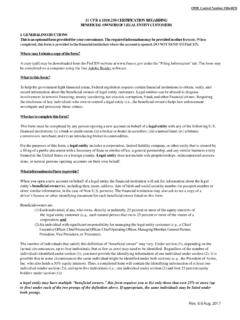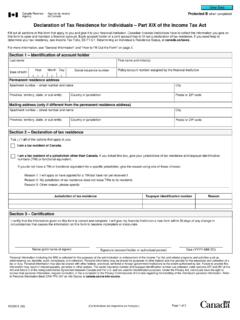Transcription of FATCA/CRS FAQs:- - ICICI Bank
1 FATCA/CRS FAQs:- 1. What is FATCA? The Foreign Account Tax Compliance Act (FATCA) is a United States federal law that requires United States persons, including US persons who live outside the United States, to report their financial accounts held outside of the United States, and requires foreign financial institutions to report to the Internal Revenue Service (IRS) about their clients. Government of India (GOI) has signed a Model 1 Inter-Governmental Agreement (IGA) with US on July 9, 2015 which necessitates financial institutions in India to comply with FATCA. 2. What is CRS? CRS is known as Common Reporting Standards. It is an information standard for the automatic exchange of information (AEoI), developed in the context of the Organisation for Economic Co-operation and Development (OECD). The Government of India has also joined the Multilateral Competent Authority Agreement (MCAA) on June 3, 2015 and financial institutions in india to comply with CRS.
2 3. Why do we need to ask the FATCA/CRS declaration from the customer? Government of India (GOI) has signed a Model 1 Inter-Governmental Agreement (IGA) with US on July 9, 2015. The IGA provides that the Indian FIs will provide the necessary information to Indian tax authority Central Board of Direct Taxes (CBDT), which will then be transmitted to USA automatically in case of FATCA. The Government of India has also joined the Multilateral Competent Authority Agreement (MCAA) on June 3, 2015, for exchanging information with respective tax authorities from 63 partner jurisdictions which are signatories to MCAA. To enable this, CBDT has issued a notification to all financial institutions in India to comply with the CRS and FATCA regulations. 4. What if I don t give this information? We have to abide by regulations issued by local regulatory authority CBDT and Reserve bank of India. In the absence of you providing the necessary details, we may not be able to process your application to open the account.
3 5. Who is a US person? A US person is: 1. A citizen or resident of the ; 2. A US partnership; 3. A US corporation; 4. Any estate (other than a non US estate); and 5. Any trust if 1. A court within the is able to exercise primary supervision over the administration of the trust, and 2. One or more persons have the authority to control all substantial decisions of the trust. 6. What is an Indicia? Indicia means and indication a person being US person or resident for tax purpose outside India (i) A citizen or resident for tax purpose outside of India; (ii) A person whose country of birth is other than India (iii) Current residence address or mailing address of a country other than India (iv) Telephone number is of a country other than India; (v) Standing instructions to pay amounts from the account to an account maintained in a country other than India (vi) Current power of attorney or signatory authority granted to a person with a address outside of India; or (vii) An in-care-of address or a hold mail address outside of India that is the sole address the FFI has identified for the account holder.
4 7. What is TIN? Taxpayer Identification Number (TIN) is a nine digit identification number used by the Internal Revenue Service (IRS) in the administration of tax laws in US. It is issued either by the Social Security Administration (SSA) or by the IRS. A Social Security number (SSN) is issued by the SSA whereas all other TINs are issued by the IRS. In the context of countries other than US, TIN is any tax identification number or its functional equivalent. 8. Is it mandatory to obtain Tax Identification Number (TIN), if the individual or entity is identified as a US Person or Person resident outside of India? Yes, if the individual or entity is identified as US Person or Person resident outside of India, we should obtain TIN or its functional equivalent. 9. When an Indicia is found and the person denies that he/she is a citizen or resident of a country other than India, can we rely on the documentary evidence and self-certification that he/she is not a person of a country other than India or do we need some other form of self-certification?
5 In such cases we can rely on the self-certification that allows the account holder to positively acknowledge by signature or other means that the certification is correct provided he/she provides appropriate documentary evidence to confirm their status and the bank has no reason to believe that he/she is a citizen or resident of a country other than India. In case of entities are we supposed to do a due diligence on the controlling person or can we rely on the self-declaration from the entity about their controlling person? We can rely on the self-declaration from the entity about their controlling person s status. 10. Whether single annexure can be used for multiple account holders? No, One annexure is for one holder. In case of multiple holder in the single account multiple annexures need to be taken. It is mandatory to select the account holder type in the FATCA/CRS annexure. primary, joint, mandate.
6 Separate annexure to be filled up for the mandate holder also. In case of minor accounts, annexure to be filled up by the guardian with details of the guardian. FATCA/CRS annexure is not mandatory for Minor. 11. Is it mandatory to select the Account holder residential status in the FATCA/CRS annexure? Yes, it is mandatory for each annexure obtained from the account holder (s). 12. Which fields are to be mandatorily filled in PART I section of FATCA/CRS annexure? All fields are mandatory. Explanation for each fields in PART I of FATCA/CRS annexure as follows. Form shall be rejected if any of these details are not filled or are incomplete. S. No. Particulars Explanation 1 Country of birth Sourcing channel to check the country of birth against the place of birth mentioned in the passport & mention the same accordingly in the declaration. 2 Country of citizenship To be declared as per the passport issuance country. 3 Country of residence for TAX purposes Customer to mention the name of the country where he is liable for income tax.
7 If a person not liable to pay income tax in any country (including India) then customer may declare country of residence for TAX purpose as NA, student, dependants, etc. 4 Current Residence (Overseas country for NRI) Should be declared as per the visa issuance country in case of NRIs. 5 US person (Yes/No) Refer definition of US Person on page no 3 of FATCA/CRS Annexure 13. What are all the scenarios TIN (Tax Identification Number) will become mandatory for NRI Customer? Under part I, in any of the parameter, country name declared by the customer is other than India then customer has to mandatorily declare the TIN in PART II of FATCA/CRS annexure along with the issuance country name. Further, if the telephone / mobile number is out of India, TIN in PART II of FATCA/CRS annexure along with the issuance country name is mandatory. 14. What if customer does not have the TIN number whereas customer has declared the country name as Other than India in PART I of FATCA/CRS annexure or has an out of India phone / mobile number?
8 In such cases, Branch may request the customer to declare the Functional equivalent of TIN of the country other than India declared in PART I. It is mandatory to mention the functional equivalent document type name, number and issuance country in PART II. Operations team shall input the same in Remarks under Document details. Functional Equivalent of TIN includes the following: A social security/insurance number, citizen/personal identification/services code/national identification number, a resident / population registration number, Alien card number, etc.. A reference list of different countries with respective TINs or Functional equivalents is attached herewith. 15. In which scenarios NRI customers need not submit TIN / Functional equivalent? Such scenarios are as follows, a) Current residence country of customer is not issuing TIN/Functional equivalent. b) Dependent visa holders. c) Student visa holders. d) Seafarers. e) Going abroad for first time.
9 In such cases, the specific document details, document number needs to be mandatorily mentioned in the annexure in the specified places. dependent visa number for a dependent, student visa number for a student, etc. 16. Whether customer signature is mandatory in PART III of FATCA/CRS annexure? Yes, it is mandatory for all customers (Including Resident and Non-Resident). 17. Whether self certification is applicable for NRIs? No, self certification is not applicable for NRIs. 18. Who can sign the PART IV Self-certification in FATCA/CRS annexure? Self certification to be accepted only if customer denies to be a US person whereas he has a place of birth as US or he is a person tax resident in India but has some Indicia (as mentioned in answer to Q. no. 5 above) out of India. 19. If one of the partners or a director is a Non Indian are we supposed to collect the information about them and if yes are they supposed to give self-declaration?
10 We need to check if the said partner or director controls more than 15% ( in case of partnership) and 25% ( in case of a corporate), if yes we need to collect the self-certification which need to be signed by the Authorised Signatory (as per MOP/director/company secretary , MD/Chairperson). The natural person (controlling person/ beneficial owner) need not give a self-declaration. 20. Who is called as controlling beneficial owner? The natural person holding controlling stake as per the PMLA guidelines 15 % or more for partnership /trusts and 25% or more for entities. In cases where there exists doubt as to whether the person with the controlling ownership interest is the beneficial owner or where no natural person exerts control through ownership interests, the identity of the natural person exercising control over the juridical person through other means to be determined. Wherever the reporting is applicable, the details under FATCA/CRS to be collected for the controlling persons.
